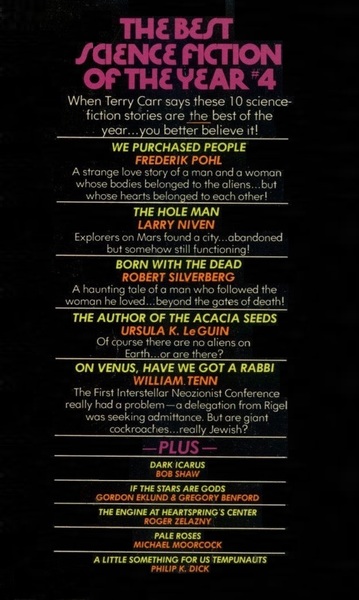
I expect a bigger budget probably had a lot to do with it - The Timescape editions contained significantly more fiction, jumping in size nearly a hundred pages from the slender Del Rey paperbacks. It was the second in the series published by David Hartwell’s Timescape imprint at Pocket Books, after Hartwell managed to lure Carr away from Del Rey, who’d published the first nine volumes.


The Best Science Fiction of the Year 11 won the Locus Award for Best Anthology of 1981, and it certainly had a lot going for it. Some of the books and magazines containing the original tales in The Best Science Fiction of the Year 11 It’s more a journey into the past, a chance to explore some of the most innovative and exciting SF of 1981, and see what authors whom I’ve come to love were up to early in their careers - and, especially, find an overlooked fictional gem or two. I’m not on the hunt for new authors, and not simply for entertainment, either. Opening these books now is a journey of discovery of a different sort.

Palmer’s Hugo-nominated novella “Emergence,” the tale of an 11-year-old girl traveling through a post-apocalyptic US “The Thermals of August,” Edward Bryant’s Hugo and Nebula-nominated tale of wingsuit-wearing daredevils on a wonderfully realized alien world Gene Wolfe’s Hugo-nominated classic “The Woman the Unicorn Loved,” about a genetically engineered unicorn that escapes onto a college campus and Poul Anderson’s famous novella “The Saturn Game,” which swept all the major awards, about an immersive role playing game played by a crew exploring Saturn’s moons that turns unexpectedly deadly. When I plucked The Best Science Fiction of the Year 11 off my shelves last week, I was delighted to find it contained David R. I’d read Carr’s Best Science Fiction volumes with a skeptical eye, not at all convinced I was actually enjoying the finest stories of the year, and skip anything that didn’t grab me in the first few pages.

I was still discovering science fiction, and purely on the hunt for tales of wonder and adventure. I wasn’t a sophisticated reader in those days (not that I’m particularly sophisticated today, but at least I’m more patient). I’ve realized I enjoy these old Terry Carr anthologies much more now than when they first appeared 40 years ago. The Best Science Fiction of the Year 11 (Timescape, July 1982)


 0 kommentar(er)
0 kommentar(er)
